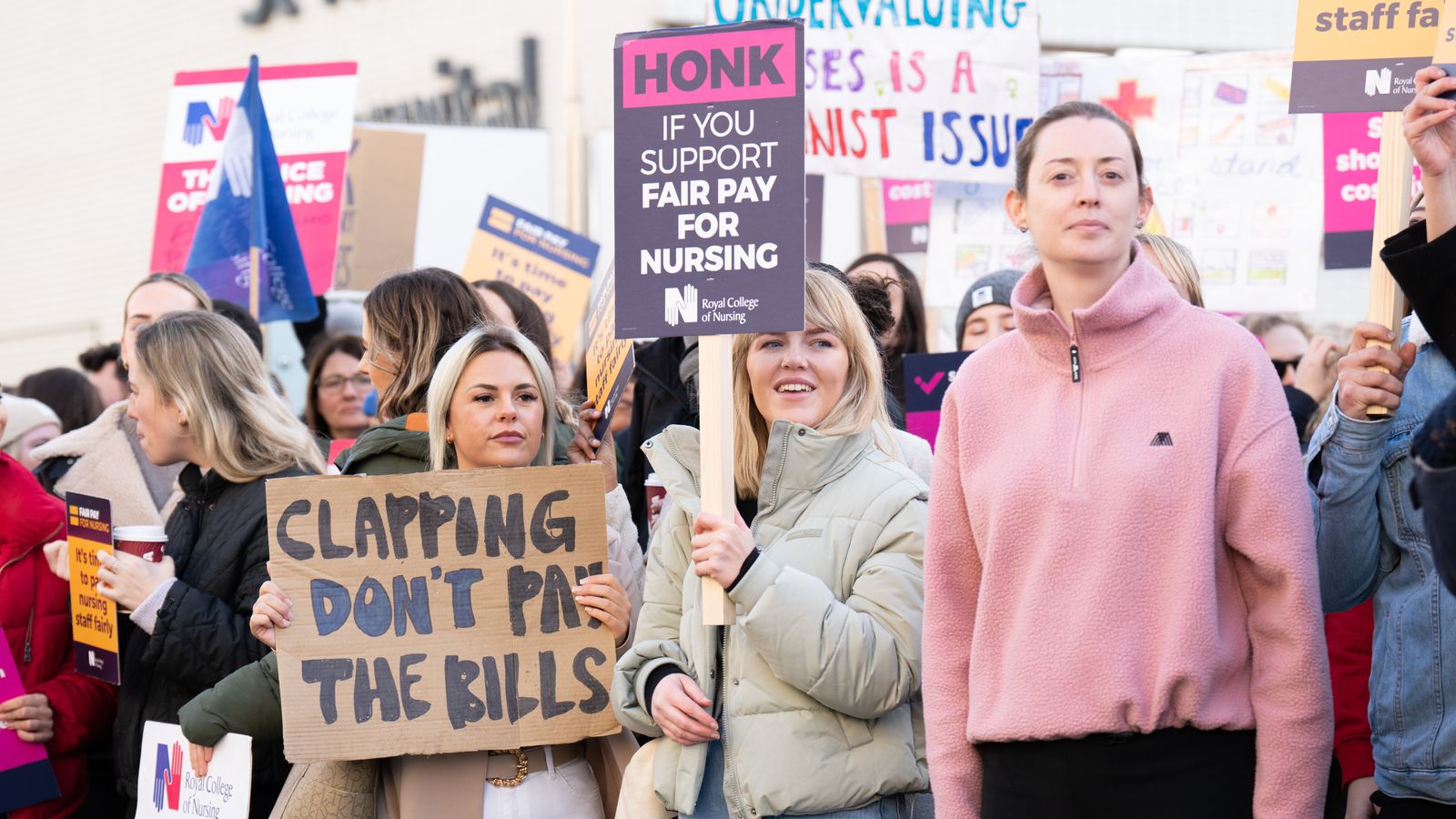The Royal College of Nursing (RCN) could accept a pay rise of around 10% to end its ongoing dispute with the government, its chief has said.
The union had initially demanded an increase of up to 19% to cover soaring inflation and falls in real term wages over the past decade.
But union boss Pat Cullen has said she would be willing to “meet the government halfway”.
Sky News understands the figure of around 10% is correct.
Politics latest: Starmer embraces Brexit slogan as Labour leader sets out vision for government
Members of the RCN voted to take industrial action back in November – the first national strike by the union in its 106-year history.
They said low pay was “pushing nursing staff out of the profession and putting patient care at risk”, and called for the double-figure wage rise, along with improvements to working conditions.
But the government has continually refused to re-open negotiations when it comes to pay, saying it was right to stick to the recommendation of the independent pay review body of around 4% when public finances are struggling.
Two strike days took place in December, with two further walkouts set to take place on 18 and 19 January.
Ms Cullen told a Times Radio podcast that nurses “understand the economic climate that we’re working in” so were willing to compromise.
“There is a rhetoric out there that says the Royal College of Nursing is unrealistic, it’s looking for something that’s totally unachievable, it’s looking for 19%,” she said.
“Now I could sit here all day and tell you nurses’ pay has dropped by 20% over the last decade. Do I believe those nurses are entitled [to 19%]? Absolutely, I believe they’re entitled to 19%. But we also understand the economic climate that we’re working in.
“And what I would say to [health secretary] Steve Barclay and to the prime minister is get into a room and meet me halfway here and do the decent thing for these nurses.”
‘Safe staffing saves lives’
In his first speech of the year on Wednesday, Mr Sunak praised NHS staff for their work and said “the door is always open” when it comes to negotiations.
But he and Mr Barclay still haven’t moved on pay, and today, the government announced it would bring in new anti-strike legislation to force unions to set minimum service levels in certain sectors, with the threat of organisations being sued if they didn’t comply.
Responding to the announcement earlier, Ms Cullen said: “Last month’s action was safe for patients because of detailed discussions we chose to initiate with the NHS to protect emergency services and life-saving care. The public respected that and even ministers acknowledged our constructive approach.
“Safe staffing levels that are set in law are what we want to see year-round not just in these extreme circumstances. We’ve long campaigned for governments to be accountable for safe and effective staffing levels in the NHS and social care to prevent one nurse being left with 15, 20 or even 25 sick patients. Legislation exists in other parts of the UK and England is lagging behind.
“The evidence is unequivocal – safe staffing saves lives and having the right number of registered nurses on duty has a direct impact on the safety and quality of patient care. Today’s highly unsafe situation is what is driving our members to say ‘enough is enough’.”
A Department of Health and Social Care spokeswoman said that Mr Barclay “wants to have an honest conversation with the RCN about what is affordable in pay settlements for next year during these challenging times, and is keen to meet for discussions as soon as possible”.
She added: “We have accepted the recommendations of the independent NHS Pay Review Body in full and have given over one million NHS workers a pay rise of at least £1,400 this year.
“This is on top of a 3% pay increase last year when public sector pay was frozen and wider government support with the cost of living.”

